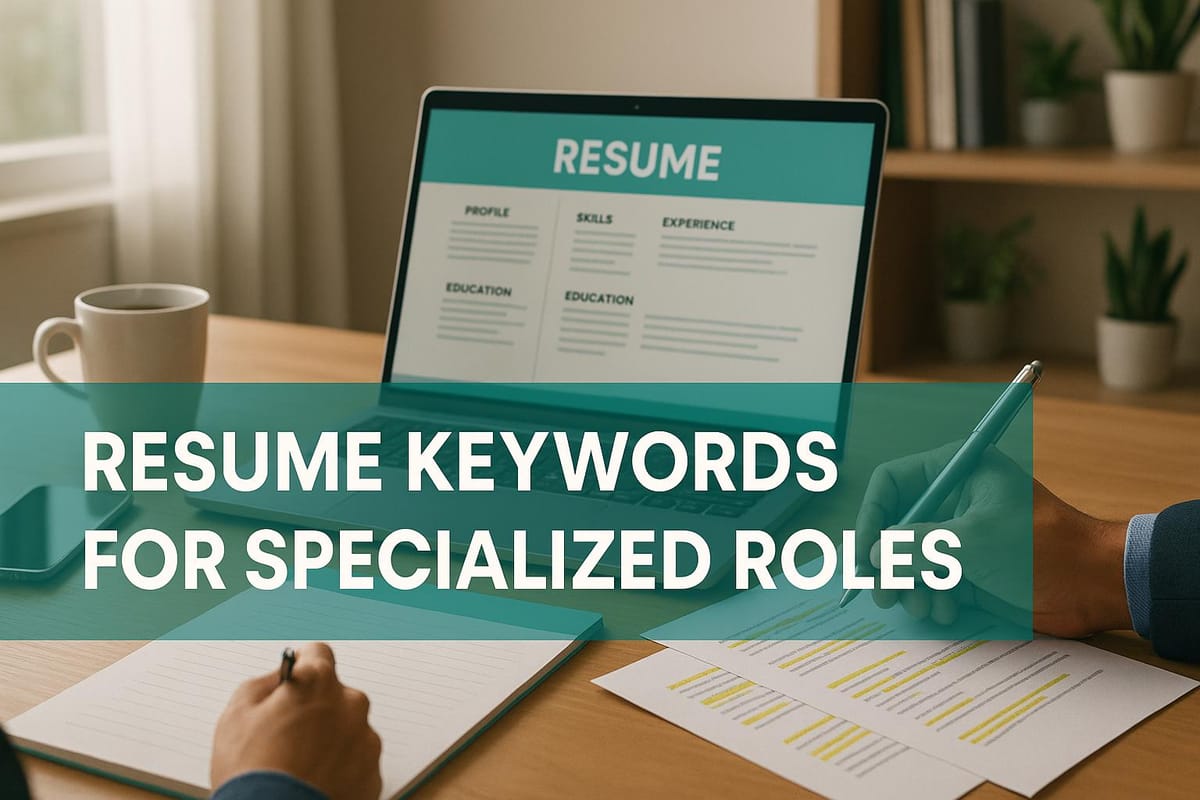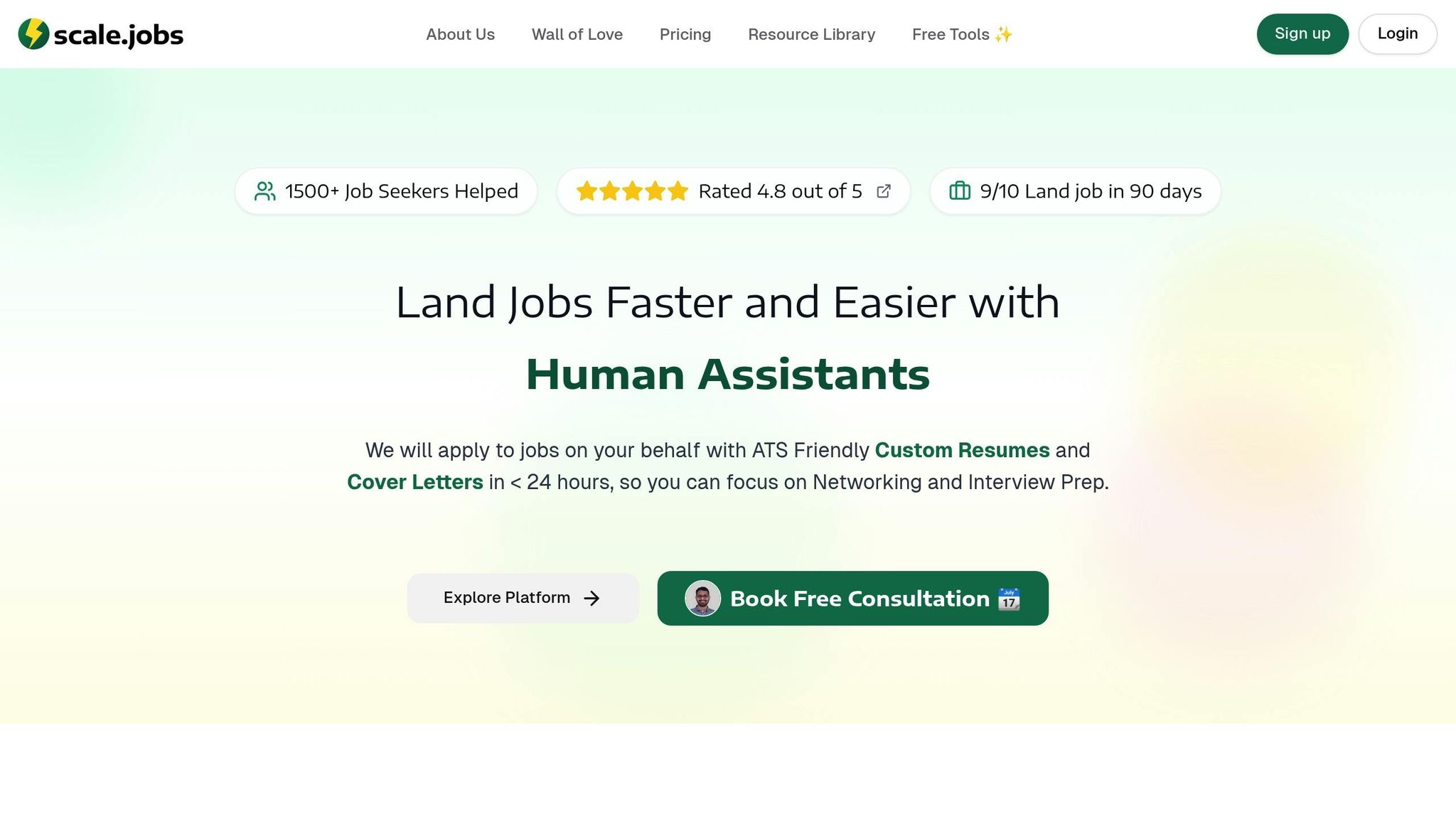Resume Keywords for Specialized Roles
Learn how to optimize your resume with targeted keywords to enhance visibility and improve chances of landing an interview in specialized roles.

Your resume might be great, but without the right keywords, it may never reach a recruiter. Why? Most companies, including 98% of Fortune 500 firms, use Applicant Tracking Systems (ATS) to scan resumes for specific terms. If your resume lacks these, it’s filtered out - 75% of resumes don’t make it past ATS software.
Key takeaway: Use job-specific keywords from postings to align your resume with employer needs. For example, a data scientist role might require terms like "Python" or "machine learning", while a nurse should include "EHR systems" or "HIPAA compliance."
How to find keywords:
- Analyze job descriptions for recurring terms in skills, qualifications, and responsibilities.
- Use industry-specific language (e.g., "Six Sigma" for manufacturing, "GAAP" for finance).
- Avoid generic phrases and focus on precise terminology.
Placement tips:
- Highlight keywords in your resume's headline, summary, skills, and experience sections.
- Integrate them naturally - don’t overstuff.
Quick tip: Tools like scale.jobs can help optimize resumes for ATS, ensuring keywords are used effectively. Tailoring your resume to each job boosts your chances of landing an interview.
Writing a Keyword Optimized Resume: Get Past the ATS Scanners (templates included)
How to Find High-Impact Resume Keywords
Identifying the right keywords for your resume takes careful research to align your skills with what employers are looking for. By combining information from various sources, you can create a targeted strategy that helps your resume stand out to both applicant tracking systems (ATS) and recruiters.
Finding Keywords in Job Descriptions
Job descriptions are a goldmine for resume keywords. They reflect the exact terms hiring managers use when describing their ideal candidate. Start by gathering multiple job postings for the role you’re targeting and look for recurring terms and phrases.
Focus on areas like required skills, preferred qualifications, and job responsibilities. For instance, if you’re aiming for a data scientist role, you might repeatedly see terms like "machine learning", "Python", and "data visualization." These frequent keywords should be prioritized on your resume.
Use AI tools like ChatGPT to streamline keyword extraction. AI can help identify important terms, but it’s essential to review the results to ensure they align with the job’s core requirements. Include both technical and soft skills relevant to the role. For example, a software engineering manager position might feature keywords like "agile methodologies", "cross-functional collaboration", and "stakeholder management", alongside technical terms such as "Java" and "microservices architecture."
Create a master list of keywords based on your research. Rank them by how often they appear in job postings. The most common terms should take precedence, while less frequent ones can be reserved for tailoring applications to specific companies. Once you’ve compiled your list, refine it by using precise industry jargon to demonstrate your expertise.
Using Industry-Specific Terms
Every field has its own specialized language, and using the right terms shows you’re familiar with the industry. Avoid generic phrases that won’t stand out against candidates who know the lingo.
For example:
- Healthcare professionals should specify certifications like "ACLS" or "BLS" instead of simply saying "certified nurse."
- Financial analysts might include terms like "GAAP", "SOX compliance", or "variance analysis" rather than broad phrases like "financial reporting."
- Software developers should highlight specific tools and methodologies, such as "React.js", "Node.js", or "CI/CD pipelines", instead of the general term "web development."
Stay up-to-date with industry trends and technologies. For example, cloud computing professionals might include terms like "Kubernetes" or "serverless architecture", while marketing specialists could use phrases such as "marketing automation" or "customer journey mapping."
Professional associations and industry publications are excellent resources for identifying current terminology. For instance, the Project Management Institute emphasizes terms like "agile project management" and "risk mitigation", while the American Marketing Association focuses on concepts like "omnichannel marketing" and "customer lifetime value."
Don’t forget compliance and regulatory terms, which are crucial in many industries. Healthcare professionals might reference "HIPAA compliance", while financial roles could include knowledge of "Dodd-Frank" or "Basel III." Manufacturing professionals might benefit from terms like "ISO 9001" or "Six Sigma."
scale.jobs as a Keyword Optimization Tool

Once you’ve researched keywords, scale.jobs can take your resume to the next level, helping it pass ATS filters while appealing to recruiters. It combines AI-driven optimization with human expertise to ensure keywords are placed naturally and effectively.
What sets scale.jobs apart from competitors like Jobscan and Rezi.ai?
- AI-powered customization with human review ensures keywords are contextually appropriate.
- Flat-fee pricing starting at $199 for 250 applications eliminates the need for costly subscription models.
- Real-time WhatsApp updates and proof-of-work screenshots provide unmatched transparency.
- Unlimited tailored resumes automatically incorporate relevant keywords for each job application.
- Industry-specific virtual assistants validate terminology for accuracy and relevance.
The AI Assistant Pro from scale.jobs generates unlimited resumes tailored to specific job descriptions. Instead of relying solely on keyword scoring, it strategically places terms throughout your resume in a way that feels natural and professional.
With flat-fee pricing starting at $199 for 250 job applications, scale.jobs is a budget-friendly option for active job seekers. The platform also offers a free ATS checker to analyze your resume against job descriptions and provide actionable feedback. Additional tools for tracking applications, creating cover letters, and preparing for interviews ensure you build a consistent professional brand that appeals to both ATS systems and recruiters.
Checklist: Key Keyword Categories for Specialized Roles
Different industries call for tailored keyword strategies to navigate ATS filters and grab a recruiter's attention. Below, you'll find keyword checklists for five major fields to help you refine your resume and boost your chances of landing an interview.
Technology and Software Development
In software development, programming languages and frameworks dominate job postings. An analysis of nearly 1,000 job descriptions found that programming knowledge appeared in 973 of them, making it the top skill category.
Key technical terms include:
- Programming Languages: JavaScript, Python, Java, C++, TypeScript, Go, Rust, Swift
- Frontend Frameworks: React.js, Angular, Vue.js, Next.js, Svelte
- Backend Technologies: Node.js, Express, Django, Flask, Spring Boot, .NET Framework
- Databases: MySQL, PostgreSQL, MongoDB, Redis, Elasticsearch
- Cloud Platforms: AWS, Azure, Google Cloud Platform, Docker, Kubernetes
- Testing Tools: Jest, Mocha, Selenium, Cypress, unit testing, integration testing
- Version Control: Git, GitHub, GitLab, Bitbucket
Pair these with measurable results like "reduced AWS costs", "improved code quality", or "enhanced system response time." Highlight system design skills with terms like "designed scalable systems" or "implemented load balancing."
Don't forget soft skills. Keywords like "mentored junior developers", "led cross-functional teams", and "streamlined engineering processes" showcase leadership and communication abilities.
Finance and Accounting
Finance roles rely on compliance and reporting keywords to meet ATS requirements and demonstrate expertise in regulations and standards.
Key terms include:
- Accounting Standards: GAAP, IFRS, SOX compliance, FASB guidelines
- Financial Analysis: Variance analysis, budget forecasting, financial modeling, ROI analysis
- Software and Tools: QuickBooks, SAP, Oracle Financials, advanced Excel, Tableau, Power BI
- Reporting: Financial statements, P&L analysis, cash flow management, balance sheet reconciliation
- Regulatory Compliance: Dodd-Frank, Basel III, anti-money laundering (AML), know your customer (KYC)
- Investment and Risk: Portfolio management, risk assessment, derivatives, asset allocation
- Tax and Audit: Tax preparation, internal controls, audit procedures, due diligence
Including certifications like CPA, CFA, FRM, or CIA can further strengthen your resume.
Healthcare and Nursing
In healthcare, patient care and compliance keywords are essential. For example, HIPAA compliance appears in 78% of healthcare job postings.
Key terms include:
- Patient Care: Patient assessment, care planning, medication administration, wound care, patient education
- Medical Systems: EHR, Epic, Cerner, MEDITECH, HL7 standards
- Compliance and Safety: HIPAA compliance, infection control, patient safety protocols, quality assurance
- Clinical Skills: IV therapy, phlebotomy, CPR/BLS certified, ACLS, PALS
- Medical Coding: ICD-10, CPT codes, medical billing, insurance verification
- Specializations: ICU, emergency medicine, pediatrics, geriatrics, oncology, surgical services
- Documentation: Clinical documentation, progress notes, discharge planning, care coordination
Certifications like "Registered Nurse (RN)" and "RN license" should be listed in multiple formats to match ATS searches. With technology playing a growing role, terms like "telehealth" and "remote patient monitoring" can also make your resume stand out.
Marketing and Sales
In marketing and sales, digital marketing and analytics keywords are front and center. Job descriptions often emphasize campaign management and CRM expertise.
Key terms include:
- Digital Marketing: SEO, SEM, PPC, Google Ads, Facebook Ads, content marketing, email marketing
- Analytics and Tools: Google Analytics, HubSpot, Salesforce, Marketo, Mailchimp, Hootsuite
- Campaign Management: Lead generation, conversion optimization, A/B testing, marketing automation
- Sales Process: CRM management, pipeline development, prospecting, closing techniques, account management
- Content Creation: Copywriting, social media content, blog writing, video marketing, influencer partnerships
- Performance Metrics: ROI, CTR, conversion rates, customer acquisition cost (CAC), lifetime value (LTV)
- Strategy: Market research, competitive analysis, brand positioning, go-to-market strategy
Highlight results like "increased lead generation by 150%" or "boosted email open rates from 18% to 31%." Industry-specific experience, such as B2B marketing or SaaS, can also add value.
Engineering and Manufacturing
For engineering and manufacturing roles, quality control and process improvement keywords are critical. Employers often seek expertise in Six Sigma and Lean methodologies.
Key terms include:
- Design and Development: CAD software like AutoCAD, SolidWorks, CATIA, product development, prototyping, 3D modeling
- Quality Systems: Six Sigma, Lean manufacturing, ISO 9001, statistical process control, quality assurance
- Manufacturing Processes: CNC machining, injection molding, assembly line optimization, supply chain management
- Project Management: PMP, project planning, resource allocation, timeline management
- Safety and Compliance: OSHA regulations, safety protocols, risk assessment
- Technical Skills: Materials science, mechanical engineering, electrical systems, automation, robotics
- Software Tools: MATLAB, LabVIEW, PLCs, SCADA systems, ERP systems
Quantify achievements with phrases like "reduced manufacturing defects by 40%" or "improved production efficiency by 25%." Including modern terms like "IoT integration" and "predictive maintenance" can show you're up to date with current trends.
Summary Table
| Industry | Most Critical Keywords | ATS Priority Level |
|---|---|---|
| Technology | Programming languages, frameworks, cloud platforms | High (973 mentions) |
| Finance | GAAP, compliance, financial analysis | High |
| Healthcare | HIPAA, EHR systems, patient care | Critical (78% of postings) |
| Marketing | Campaign management, CRM, digital marketing | High |
| Engineering | Six Sigma, CAD, quality systems | High |
"ATS systems scan for specific keywords – missing them means your resume gets filtered out before human eyes see it", according to The Interview Guys.
To optimize for ATS, aim for 2-3% keyword density and include both full terms and abbreviations for maximum compatibility.
Best Practices for Using Keywords in Resumes
Keywords can be the deciding factor in whether your application gets noticed. Research shows that candidates who include the exact job title on their resume are 10.6 times more likely to land an interview. With nearly all recruiters (99.7%) using filters in their Applicant Tracking Systems (ATS), placing keywords strategically is critical to getting past the first hurdle.
Where to Place Keywords
The headline and summary are the first things both ATS systems and recruiters see. Use this space to highlight your most relevant keywords right away. Including the exact job title from the posting in your headline or professional summary can significantly improve your chances of passing the initial screening.
Your skills section is another prime spot for keywords, as 76.4% of recruiters filter candidates by specific skills. Focus on hard skills, tools, and certifications, mirroring the exact language from the job description. Adding a "Core Competencies" or "Areas of Expertise" section below your summary can help showcase your technical and soft skills in a way that's easy to scan.
The work experience section is where you can give keywords context. Instead of just listing skills, integrate them into bullet points that demonstrate how you’ve used those abilities to achieve results. Begin each bullet point with action verbs and align your phrasing with the job description.
Don’t ignore the education section, especially if you're a recent graduate or transitioning careers. Include keywords related to your field of study, coursework, or degrees to highlight relevant academic experience.
To maximize effectiveness, repeat core skills across different sections of your resume.
Avoiding Keyword Stuffing
While keywords are essential, overloading your resume with them - known as keyword stuffing - can hurt your chances. ATS systems and recruiters can easily spot when keywords are awkwardly crammed into sentences.
Instead, weave keywords naturally into sentences that highlight your experience. For instance, rather than listing "project management, team leadership, budget oversight" as standalone terms, write: "Led cross-functional project teams of 12+ members, managed $2.3M annual budgets, and delivered projects 15% ahead of schedule."
Use variations and synonyms to cover different keyword possibilities without sounding repetitive. For example, if the job description mentions "customer service", you could also include terms like "client relations", "customer support", or "customer experience" where appropriate.
Above all, focus on quality over quantity. A few well-placed keywords within strong achievement statements are far more effective than forcing in every possible keyword at the expense of readability.
Customizing Resumes for Each Application
Taking the time to tailor your resume for each job application is no longer optional - it's essential. According to Jobscan, matching the job title exactly on your resume can boost your interview chances by over 10 times. With 98.4% of Fortune 500 companies using ATS systems, customizing your resume to align with the job description is a must.
Start by analyzing the job description. Highlight the skills, qualifications, and experiences that are mentioned most frequently, as these are likely the employer's top priorities.
Next, match your experience to the role by emphasizing responsibilities and achievements that align with the position. For instance, if you're applying for a data analyst role that prioritizes SQL and Python, make sure these skills are prominently featured in your work experience section.
Update your skills section for each application, placing the most relevant technical and soft skills at the top. Some ATS systems assign more weight to keywords that appear earlier in the list.
Here’s a real-world example: In October 2023, Kelley Greene tailored her resume for a Sales Manager role at Saul's Supplies. The job description highlighted team management, training implementation, and sales strategy development. Greene’s resume showcased her experience leading a team of 8-10 sales reps, setting sales objectives, and creating training programs that reduced turnover by 25%. She also included a customer acquisition strategy that boosted sales by 15% annually (Source: Indeed.com, 2025).
To make your bullet points even more impactful, use the STAR method (Situation, Task, Action, Result). This approach naturally integrates keywords into meaningful descriptions of your achievements.
"When I review resumes, I scan for certain skills such as contract writing, program development, and supervisory experience. I only interview candidates that have one or more skills specific to the job description. The more skills they have pertaining to the job, the more likely I am to interview them." - Jessica Hinkle, Human Welfare Programs Professional
Customizing your resume doesn’t stop at adding keywords. Focus on showcasing achievements with measurable results that align with what the employer values most. Quantifiable metrics can make your resume stand out while reinforcing the relevance of your experience.
Conclusion: Improve Your Resume with Targeted Keywords
Using targeted keywords in your resume can position you as the perfect candidate for specialized roles. In fact, resumes that closely match job-specific keywords are up to three times more likely to catch a recruiter's attention, according to Jobscan research.
To make your resume stand out, focus on relevance and precision. Start by thoroughly analyzing job descriptions. Tools like word cloud generators or resume keyword analyzers can help you identify the most frequently used terms. Pair this with research into industry-specific jargon to ensure you're speaking the same language as potential employers.
Incorporate these keywords naturally into your achievement statements - this way, you're showcasing your skills without falling into the trap of keyword stuffing. Stay proactive by regularly reviewing job postings and updating your resume to reflect changes in technology and industry trends.
For those looking for an extra edge, tools like scale.jobs can simplify the customization process. Their free ATS-compliant resume builder and keyword checker help pinpoint gaps in your current resume. If you're ready to take it a step further, their $9/month AI Assistant Pro offers unlimited customized resumes and cover letters tailored to each application. What’s unique about scale.jobs is their human assistant service. For a flat fee, trained virtual assistants manage your entire job search, providing updates via WhatsApp, proof-of-work screenshots, and eliminating the hassle of recurring subscriptions.
Tailoring your resume to match each job's specific requirements is an investment of time that pays off. By combining strategic keyword research with the right tools and an authentic presentation of your experience, you’ll ensure your resume not only passes ATS screenings but also lands in front of the right decision-makers.
Your skills deserve to shine. The right approach transforms your resume from just another application into a persuasive argument for why you’re the ideal fit for the role.
FAQs
What are the best ways to find and use keywords in my resume for a specialized role?
To find the best keywords for your resume, start by thoroughly examining the job posting. Pay close attention to skills, tools, job titles, and certifications listed in the description. Make sure to weave these terms naturally into your resume, sticking to the exact phrasing whenever possible to align with Applicant Tracking System (ATS) filters.
Customize your keywords for every application. Use strong action verbs and industry-specific language to showcase your expertise and accomplishments. This strategy not only helps you pass ATS scans but also grabs the recruiter’s attention.
How can I use resume keywords effectively without overloading my resume?
To make the most of keywords in your resume, weave them naturally into the summary, experience, and skills sections. Use them in sentences that genuinely highlight your expertise and achievements, rather than just listing them without context.
Organize similar skills into categories and present them with bullet points for better readability. For instance, instead of simply naming tools or techniques, explain how you used them in real-world projects. Stay away from shady practices like hiding keywords in white text - ATS systems can spot and flag these tricks. The goal is to create a resume that's both ATS-friendly and appealing to human recruiters.
What makes scale.jobs stand out for creating ATS-friendly resumes compared to other tools?
Why Scale.jobs Stands Out
Scale.jobs takes a unique approach by blending human expertise with cutting-edge software to craft ATS-friendly resumes. While many services lean heavily on automation, Scale.jobs sets itself apart by offering trained human virtual assistants. These experts tailor your resume and cover letter to align perfectly with each specific job application, boosting your chances of passing ATS filters.
What’s more, Scale.jobs keeps you in the loop with real-time updates sent via WhatsApp, ensuring complete transparency with proof-of-work. Their flat-fee pricing model also eliminates the hassle of recurring subscriptions. This combination of personalized service and clear communication gives job seekers a distinct advantage over platforms like Jobscan or ResumeGenius, which often lack the personal touch and customized solutions.




